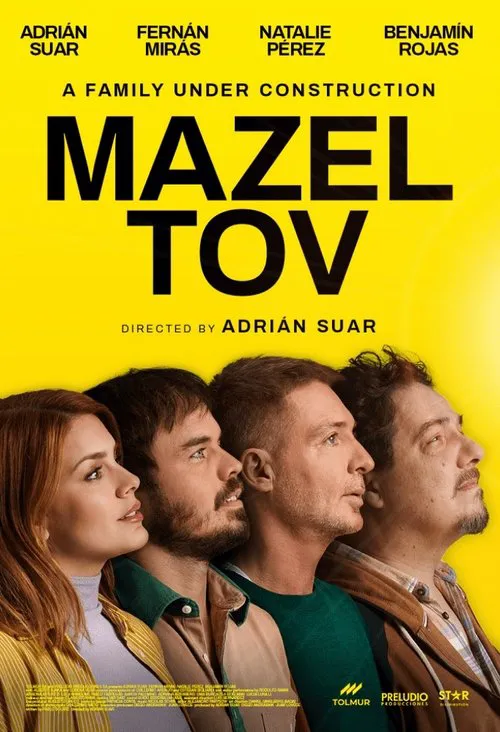Mazel Tov

Plot
In the midst of celebrating the union of love and spirituality, the Roitman family finds themselves confronting the harsh realities of life. Dario Roitman's well-crafted plans to bring his family together for a joyous occasion are cruelly upended, plunging the family into a state of collective grief and emotional turmoil. As the family gathers to pay their final respects to Dario's recently deceased father, their carefully constructed facade of happiness and unity crumbles, revealing the underlying fissures and tensions that threaten to tear them apart. The film's narrative weaves a poignant tale of family dynamics, love, loss, and tradition, set against the vibrant backdrop of Argentine culture. As the Roitmans navigate the complex web of emotions and relationships, it becomes apparent that their family is not as cohesive as they had once imagined. Undercurrents of resentment, disappointment, and unresolved conflicts surface, threatening to jeopardize the celebrations and create further divisions within the family. Dario's decision to push forward with the wedding and Bat Mitzvah, despite the family's grief, sets the stage for a series of poignant and often humorous confrontations. As the family comes together to honor their loved one, they are forced to confront their own personal demons and the unfinished business they have with one another. This includes Dario's complicated relationship with his father, which is marked by a deep sense of responsibility and guilt. Throughout the film, director's [unspecified] masterful touch brings to life a rich tapestry of characters, each with their own distinct personality and story. We are introduced to Dario's flamboyant and charismatic mother, Elena, who struggles to balance her love for her family with her desire for individuality and independence. Her eccentric behavior and constant need for validation create tension within the family, particularly with her husband's siblings, who are increasingly disenchanted with her lifestyle. The arrival of Dario's sisters from the United States, who have grown distant from their Argentine roots, serves as a catalyst for renewed family conflict. Their divergent values and cultural affiliations raise questions about identity and belonging, leading to debates and disagreements that have the potential to tear the family asunder. Meanwhile, Dario's efforts to maintain a sense of unity and normalcy in the face of tragedy serve as a poignant reminder of the transformative power of love and family. One of the most striking aspects of the film is its nuanced portrayal of the complexities of Jewish culture and tradition. As the family prepares for the wedding and Bat Mitzvah, they grapple with questions of identity and faith, seeking to balance their adherence to tradition with their personal convictions and aspirations. This struggle is particularly evident in the character of Dario's younger sister, who is embarking on her transitional journey into womanhood amidst the whirlwind of family dynamics. In a touching and often hilarious sequence of events, the Roitman family comes together to share their stories, traditions, and quirks. This communal moment of connection and vulnerability serves as a bittersweet reminder of the deep-seated bonds that unite the family across the generations. Despite their differences and the overwhelming grief that pervades the narrative, the Roitmans are able to heal, forgive, and ultimately find love and acceptance in the midst of sorrow. Ultimately, Mazel Tov serves as a heartfelt tribute to the enduring power of family and tradition. This beautifully crafted film challenges the notion that families must be perfect or harmonious, instead celebrating the messy, imperfect beauty of love and relationships. Through its poignant portrayal of the Roitman family's struggles and triumphs, Mazel Tov offers a powerful exploration of what it means to belong, to love, and to live in harmony with the people who matter most in our lives.
Reviews
Recommendations




